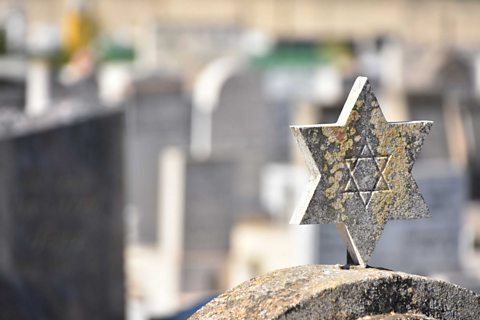The ceremonies and rites associated with death
Within Judaism, there is the belief that someone who has died deserves almost the same respect and dignity as someone who is living.
It is important to remember the person as they were alive, and so the body is covered. It is believed that the body is a source of defilementSomething which has become spoiled or less pure., and so it is put in the ground. The burial happens as soon as possible after death. If the body touches anything other than the ground, whatever it touches becomes impure.
Someone will accompany the body until the time it is buried. They will recite from PsalmsA book in the Old Testament (Hebrew Bible) containing songs of praise and worship. as they do so. Each community has a group who prepare the body for burial. This group is known as Hevrah Kadishah (Holy Society). The body is washed according to Jewish law and is placed in white linen shrouds.
A service is held and the casket is lowered into the grave with the head facing east to Jerusalem. Those in attendance will help to fill the grave. Following the service, meals will be brought by family and friends during the period of mourning.

Mourning
There are four parts to this period of mourning:
1. Aninut - this is the time between the death and the burial. The bereaved are excused from the commandments.
2. │º│¾¥▒▒╣ÔÇÖa│¾ - this means ÔÇ╚┘▒▒╣▒▓ÈÔÇÖ and it is the seven days following the service at the grave. There is a practice of sitting on a low stool and refraining from work. Mirrors are covered and prayers may be held within the house.
3. Sheloshim - this means ÔÇÿthirty daysÔÇÖ and includes the seven from the previous part. The bereaved may now bathe and go to work, but all other restrictions are kept.
4. Avelut - the next 11 months. Those who have lost a parent will continue their mourning throughout this period. During this time, the bereaved son will recite the mournersÔÇÖ KaddishMourner's prayer in Judaism, traditionally recited by the oldest son on the occasion of a parent's death. in the hopes of releasing the deceased from sin.